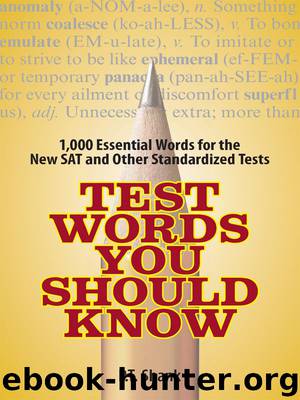Test Words You should Know by P.T. Shank

Author:P.T. Shank
Language: eng
Format: epub
Tags: subject
Publisher: Adams Media
Published: 2011-06-28T00:00:00+00:00
inherent (in-HEYR-ent), adjective
A natural and vital part of something else; an essential part of a larger whole that cannot be removed
The inherent risk in extreme sports is part of their allure for many participants.
inimical (ih-NIHM-ih-cul), adjective
Counterproductive; causing harm or the opposite of the desired effect
His girlfriend's urgings that he attend the party were inimical to his studying for the test he had the next day.
innate (ih-NAYT), adjective
Existing from birth; natural and inborn; essentially a part of something; coming naturally, not learned
His parents discovered he had an innate ear for music when he sat down at a piano and began to play when he was only five.
innocuous (ih-NAWK-yoo-uhs), adjective
Completely harmless to the point of being disregarded; tame; not offensive
It took several bad relationships before she finally saw: nice guys as being more than totally innocuous.
innovation (in-oh-VAY-shun), noun
A new creation, usually that moves a field forward in some way
Scientists expect medical innovations to increase human life expectancies by many years.
inscrutable (in-SKROOT-uh-bul), adjective
Difficult or impossible to understand or know; incomprehensible; hard to get a handle on, as in a person, attitude, or concept
The contestants tried to read the judges in order to guess the result, but their faces were inscrutable throughout the competition.
insensible (in-SENS-uh-bul), adjective
Too small to be noticed or to register; imperceptible; or temporarily unconscious or without feeling, usually due to external factors such as alcohol, violence, or extreme temperature; or unaware, insensitive to or indifferent; uncaring; unfeeling emotionally
None of them noticed the insensible change in the light as the sun set until they realized they were sitting in the dark and had to turn on a light.
The blow to the head knocked the boxer insensible for several minutes.
She wasn't insensible toward her students' complaints but knew they needed the extra work if they were going to pass the test.
insinuate (in-SIN-yoo-ayt), verb
To hint, suggest, or subtly make known, generally regarding something negative; or to introduce oneself into a setting through crafty and somewhat unwelcome or negative means
Although his words seemed innocent enough, everyone knew he was trying to insinuate that the director was doing a poor job.
She was able to insinuate herself into the queens inner circle through subtle bribery and indirect threats.
insipid (in-SIP-id), adjective
Unexciting; lacking in flavor, life, or vigor; boring and dull
After living in the city, she found life in a small town insipid and unbearable.
insolvent (in-SOL-vent), adjective
Unable to pay debts or what is owed; without money or assets
The president of the small company knew: if they did not win a contract soon, the company would become insolvent and would have to close.
insouciant (in-SOO-see-aynt), adjective
Casual indifference or unconcerned; nonchalant
Although he tried to be insouciant about his acceptance to an Ivy League college, his friends knew he was very excited about it.
instigate (in-STIH-gayt), verb
To stir up or urge; to start, begin, or initiate
Even after years of marriage, they couldn't agree on which one of them instigated their first kiss.
insularity (IN-sul-ayr-ih-tee or INS-yoo-layr-ih-tee), noun
The state of being detached, either physically or emotionally; characterized by having little or no contact with others
In a
Download
This site does not store any files on its server. We only index and link to content provided by other sites. Please contact the content providers to delete copyright contents if any and email us, we'll remove relevant links or contents immediately.
Spare by Prince Harry The Duke of Sussex(5167)
Navigation and Map Reading by K Andrew(5143)
Tuesdays with Morrie by Mitch Albom(4755)
Machine Learning at Scale with H2O by Gregory Keys | David Whiting(4284)
Cracking the GRE Premium Edition with 6 Practice Tests, 2015 (Graduate School Test Preparation) by Princeton Review(4266)
Never by Ken Follett(3922)
Goodbye Paradise(3791)
What It Really Takes to Get Into Ivy League and Other Highly Selective Colleges by Hughes Chuck(3734)
Fairy Tale by Stephen King(3358)
Harry Potter and the Prisoner of Azkaban (Book 3) by J. K. Rowling(3341)
Pledged by Alexandra Robbins(3167)
Kick Ass in College: Highest Rated "How to Study in College" Book | 77 Ninja Study Skills Tips and Career Strategies | Motivational for College Students: A Guerrilla Guide to College Success by Fox Gunnar(3107)
Reminders of Him: A Novel by Colleen Hoover(3065)
A Dictionary of Sociology by Unknown(3059)
Sapiens and Homo Deus by Yuval Noah Harari(3053)
The Social Psychology of Inequality by Unknown(3011)
Graduate Admissions Essays, Fourth Edition: Write Your Way into the Graduate School of Your Choice (Graduate Admissions Essays: Write Your Way Into the) by Asher Donald(2899)
Will by Will Smith(2892)
Zero to Make by David Lang(2772)
